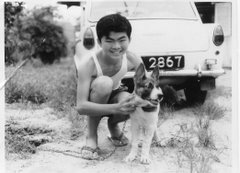 I cannot
recall for sure; but I think he told this story to a bunch of foreign
correspondents at an event in Helsinki. Anyway, this story is based on a
Chinese idiom; 塞翁失马,安知非福*. This story can be found in The Straits Times
Bilingual Collection, Vol 1, page 86, under the title, Fortunes and misfortunes.
I cannot
recall for sure; but I think he told this story to a bunch of foreign
correspondents at an event in Helsinki. Anyway, this story is based on a
Chinese idiom; 塞翁失马,安知非福*. This story can be found in The Straits Times
Bilingual Collection, Vol 1, page 86, under the title, Fortunes and misfortunes.
But
when I was telling this story to my children when they were young, I titled it,
The Story of Sai Weng.
 |
| * Sometimes written as 塞翁失马,焉知非福 |
Long ago,
there was an old man who lived at the border. His wife had died more than 10 years
ago, leaving him with a son, whom he brought up. The old man had a mare which
he took good care of. When the mare became pregnant, he became very busy and
happy. He planned to sell the colt when it had grown so he could use the money
to get a wife for his son.
Unfortunately, when the mare was
about to deliver, it suddenly disappeared. The old man and his son searched everywhere,
but could not find it. The old man was very sad. After some time, however, he
was himself again and behaved as if nothing had happened. His neighbours came to
comfort him. The old man, moved by their concern, said: “I do appreciate your
concern. However, do not vex yourselves over my problem. Although I have lost
my horse and cannot afford to have a daughter-in-law now, no one can say for
sure if this is good or bad.”
Several months passed; and on one
clear and windy night, the old man heard the familiar neighing of a horse from
his bedroom. He hurried out and saw 3 horses coming towards him. When he
realized that one of the horses was his very own mare, he shouted for joy.
There was also a small horse which apparently was the mare’s offspring. He
hastily brought them to his stable. When the neighbours, who had been awakened
by the noise, learned what had happened, they came to congratulate him. The old
man was extremely happy. After some time, however, his face darkened briefly
and sighing, he said calmly; “Let’s not be too happy. This could be a
misfortune.” His words caused laughter, and everyone said he was
over-suspicious.
The old man’s son loved the young
colt and rode it often. One day, while galloping along a mountain track, he
fell and broke his leg. Many surgeons were consulted, but he could not be
cured, and eventually became a cripple. The neighbours came to comfort him.
After thanking them for their concern, the old man said: “Though my son has
become a cripple, there is no need to grieve, for who knows what good may come
out of this incident.” The neighbours were puzzled by what he said.
One year later, the imperial
court decided to wage war against a neighbouring state. All the able-bodied
young men were conscripted into the army and most of them never returned from
the battle field. The village became deserted and quiet. Only the old man’s son
who had been disqualified because of his disability escaped conscription. Thus
even in the midst of the chaos of war, he got married and soon had a son. The
old man and his family lived in peace and happiness.
Many people
who witnessed this admired and said of the old man: “When the old man of the
frontier loses his horse, it may be good fortune; when he gains another horse,
it may be a misfortune.”
The End
 |
| At the end of every story, there’s a language tip like this. I learned my hanyu pinyi partly from here. |
“And we
know that all things work together for good to them that love God, to them who
are the called according to his purpose.” (Romans 8:28)




